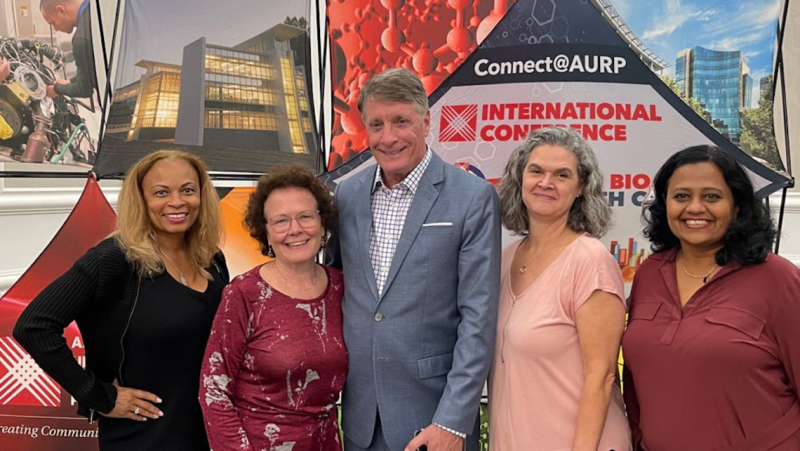TEDCO partners with Maryland universities to help tech entrepreneurs scale up

Maryland may be small, but it’s a leader when it comes to nurturing its university-based biology and technology ventures. An array of assets makes it a top choice for biology and technology companies: our state is No. 1 in federal research and development funding, No. 1 in health and human services funding, and No. 3 in NASA funding, according to the National Science Foundation. The state is also home to the largest health researcher (National Institutes of Health), the largest food and drug regulator (the Food and Drug Administration) and the largest buyer of medical procurement (Center for Medicare and Medicaid Services in Woodlawn, Maryland).
TEDCO, Maryland’s economic engine for tech companies, partners with universities to offer entrepreneurs and emerging companies critical early-stage funding, business support and mentoring. This convergence of academia, research and economic development creates a nurturing environment that connects entrepreneurs to resources that help them stay and grow their businesses in Maryland.
 One critical partnership is the Maryland Innovation Initiative (MII), a collaboration between the state of Maryland and five Maryland academic research institutions: Johns Hopkins University; Morgan State University; University of Maryland, Baltimore; University of Maryland, Baltimore County; and the University of Maryland, College Park. Pilot programs soon to be launched at Bowie State University and Frostburg University will help TEDCO extend the reach of its support.
One critical partnership is the Maryland Innovation Initiative (MII), a collaboration between the state of Maryland and five Maryland academic research institutions: Johns Hopkins University; Morgan State University; University of Maryland, Baltimore; University of Maryland, Baltimore County; and the University of Maryland, College Park. Pilot programs soon to be launched at Bowie State University and Frostburg University will help TEDCO extend the reach of its support.
The MII is designed to promote commercialization of research conducted in the partner universities through venture creation. TEDCO also works with the new ventures to create and deepen opportunities and connections, with the goal of helping the companies grow, thrive and stay in Maryland.
“Many of our portfolio companies at TEDCO started at a university research park. The parks play an important role in giving the entrepreneurs a home and nurturing them, as well as providing access to a density of talent and connections with commercial partners — which in turn helps them stay and grow in the state. Through the MII, we help the startups scale the entrepreneur ecosystem,” said Arti Santhanam, executive director, Maryland Innovation Initiative, TEDCO. “As they grow, they can access additional TEDCO funds and resources.”
At University of Maryland, Baltimore (UMB), the MII program joins other funding initiatives to support promising technologies at critical junctures. With a strong focus on life sciences and health care, the majority of UMB’s discoveries and startups are bio-based. Biotech and life sciences startups come with unique needs and risks that can pose challenges to securing funding.
“The commercialization pathway for life sciences is different than it is for many other industries. These technologies and companies require a lot of funding, long timelines, and many fail before making it to market,” said Mary Morris, director of the Baltimore Fund at UMB and MII board member. “TEDCO understands these challenges. The MII program not only provides funding to validate and de-risk a technology, an often-critical step to advancement, but is also an option as the technology develops or a startup company forms.”
Funding and program support from the MII program fosters the commercialization of promising technologies through technology validation, market assessment and the creation of startup companies in Maryland based on a technology from one of the partner universities.
Recently, TEDCO and Maryland universities teamed up at Association of University Research Parks’ (AURP) Bio Health Caucus in San Diego, held in conjunction with the Bio International Conference. The conference focused on building research space and investing in key collaborations that support communities of bio innovation and the life sciences ecosystem. The conference attracted economic development organizations, universities, researchers, developers, bio innovation managers and venture capital firms.
“Maryland had a good story at the AURP conference with the work of TEDCO and its state and county partners,” said Brian Darmody, chief strategy officer at AURP, adding that “The densest cluster of member university research parks are here in the DMV region.”
Maryland is also home to a robust group of university research park developers, including Whiting-Turner and Wexford Science and Technology. Darmody encouraged collaborations and partnerships like those with TEDCO to take advantage of new federal funding opportunities.
With the presence of universities like Johns Hopkins and UMB, 60% of all the funds in the MII program go to life sciences start-ups. “At the conference we sought out resources and talent to help our bio companies stay and grow here,” said Santhanam.
The future looks bright. With strong partner support from organizations like TEDCO and increased interest from developers understanding that life sciences teams need to be on site, Maryland’s the research parks continue to grow in popularity.
“It takes the proverbial village to build a successful ecosystem. Our collaborations with State, university systems and commercial entities through the regional research parks proves this to be true,” said Santhanam.
TEDCO, the Maryland Technology Development Corporation, enhances economic empowerment growth through the fostering of an inclusive entrepreneurial innovation ecosystem. TEDCO identifies, invests in and helps grow technology and life science-based companies in Maryland. Learn more at tedcomd.com.
Tammi Thomas is TEDCO's chief marketing and communications officer
Source: Baltimore Business Journal